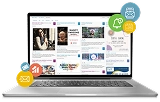
How to Create an Event Agenda: 7 Steps, Example and Template
In this guide, we’ll walk you through best practices for creating an effective event agenda, with event agenda examples and a downloadable event agenda template to help you get started. You’ll also discover how to use agenda planning tools to streamline the process and deliver a schedule that works.
A well-structured event agenda is the foundation of any successful event. Whether you’re hosting a conference, webinar, training, or community gathering, a thoughtful agenda boosts engagement, simplifies logistics, and ensures everyone knows what to expect. The right schedule can transform the experience for both organizers and attendees.
Whether you're an event organizer, educator, or venue manager, this guide is tailored to help you simplify your agenda planning and maximize impact.
I. What is an Event Agenda?
An event agenda is a clear, structured schedule that outlines the flow of activities, presentations, and interactions during an event. Think of it as the event’s blueprint: it organizes sessions, breaks, networking opportunities, and any other activities in a logical order so participants know what to expect.
Whether you’re designing an agenda for an event planning meeting or mapping out a multi-day conference, a well-crafted event agenda makes it easier for attendees to navigate the experience while also simplifying logistics for organizers.

II. Why a Well-Planned Event Agenda Matters
A solid event agenda is more than just a list of times and topics. It acts as a communication tool, setting expectations and providing structure so that speakers, staff, and participants can align around a shared plan.
Indeed, a smartly organized event agenda does more than list sessions, it enhances your entire event planning experience, for example:
- Maximizes engagement: Keeps attendees focused and interested throughout.
- Improves time management: Helps ensure sessions stay on track.
- Boosts attendance: Communicates value clearly to potential participants.
- Simplifies operations: Makes planning easier for organizers, venues, and vendors.
III. How to Write an Event Agenda
1. Define Your Event Goals
Begin by defining the main objective of your event planning meeting agenda. Are you educating, inspiring, networking, or launching something new? This will guide your session structure, topics, and speakers. For example, if the goal is networking, allocate more time to roundtable discussions or mixers.
2. Understand Your Audience
Know who you're planning for. That is, think about their interests, professional roles, time zones (for virtual events), and session format preferences (talks, panels, workshops). An agenda that resonates with a tech-savvy crowd might include hands-on labs or hackathons, while an executive audience may prefer thought leadership panels.
3. Choose the Right Mix of Sessions
A compelling event planning agenda balances different formats:
- Keynotes to set the tone
- Panel discussions for expert insights
- Breakout rooms or workshops for interaction
- Networking slots for informal engagement
This balance supports better agenda planning and allows your schedule of events to offer variety. Therefore, alternate between high-energy and reflective sessions for optimal engagement.
4. Plan Timing Strategically
Keep sessions concise (20–45 mins), include transition time, and offer breaks. Downtime prevents fatigue and increases retention. Furthermore, use your agenda timeline to block out time accurately. Lastly, consider regional time differences and ensure meals or breaks align with attendee expectations.

5. Feature Engaging Speakers & Panelists
Look for a diverse mix of speakers who are not just knowledgeable, but also great communicators. Personal stories and practical examples go a long way. Therefore, invite local experts or previous participants to make your event feel more authentic and inclusive.
6. Add Interactive Elements
Encourage participation with live polls, Q&As, group exercises, or digital feedback forms. Since, these components boost engagement and keep your event schedule examples dynamic. Furthermore, use tools like mobile apps or real-time response systems to enhance participation.
7. Create a Winning Event Agenda with the Right Event Software
Knowing how to create an event agenda that is clear and engaging can be challenging, especially when juggling multiple sessions, or audience segments. That’s where event management software like Timely comes in to simplify the process and keep everything on track.
With Timely’s event agenda features, you can easily build, customize, and publish your event schedule online. Whether you’re hosting a single keynote or managing a multi-track conference, Timely helps you stay organized with tools like:
- Event tagging for easy filtering by topic or audience
- Personalized scheduling options so attendees can create their own event agendas
- Invite-only registrations to control who can see or sign up for specific events
- Online and onsite ticketing and capacity management for session-based registrations
- Real-time email notifications for event updates, so your attendees are always informed
By streamlining agenda creation and giving attendees more control over their event experience, Timely helps you deliver a more engaging and organized event—from start to finish.
IV. Well-Structured Event Agenda Example
A well-designed schedule sets the tone for a successful event. Exploring event agenda examples or samples can help you get started, ensuring that your schedule is both engaging and easy to follow.
Below is a sample event agenda format you can adapt to your needs:
You can use this event schedule example as a starting point to reflect your event’s goals, complexity, and audience needs. If you offer multiple sessions per hour, assigning time slot tickets makes managing attendance smoother and avoids overbooking.
V. Download our Event Agenda Template
With a variety of formats available, such as Word, Google Docs, and virtual agenda layouts, it’s easy to tailor your event schedule to meet your goals. Simply fill out the form below to download our free event agenda template and customize it to suit your needs.
Claim Your Free Event Agenda Template
VI. Timely Agenda Planning Features
Timely is a comprehensive event management software platform designed to help organizations create, manage, and promote events efficiently. Its intuitive interface and powerful features make it ideal for schools, businesses, municipalities, and nonprofits.
Tools that offer flexibility in agenda building can make all the difference. With Timely, you can:
- Enhance event descriptions with rich content formatting, including tables, bullet points, bolded headers, and embedded media
- Tag and filter events by category, location, speaker or custom filters
- Include time-slot ticketing to manage session-level registration and capacity with ease
- Build accessible, multilingual calendars for international attendees

VII. Final Thoughts
An impactful event agenda is more than just a schedule; it’s the roadmap to a successful experience. When built with clear objectives, smart pacing, and the right tools, your meeting schedule can shape the entire event journey.
From choosing the right event agenda format to managing registration flows, having reliable support (and a solid event agenda template) makes all the difference.
If you're ready to elevate your next event, consider using software that brings everything together: venue scheduling, event promotion, registration, and payments. All in one intuitive dashboard.
Timely’s event management solutions were recognized in Software Advice’s 2023 Front Runners Report as a top Ticketing Software, praised for ease of use and powerful features.
Let’s make your next event a success. Try Timely for free, or book a meeting with one of our experts to see what our software can do for you.






